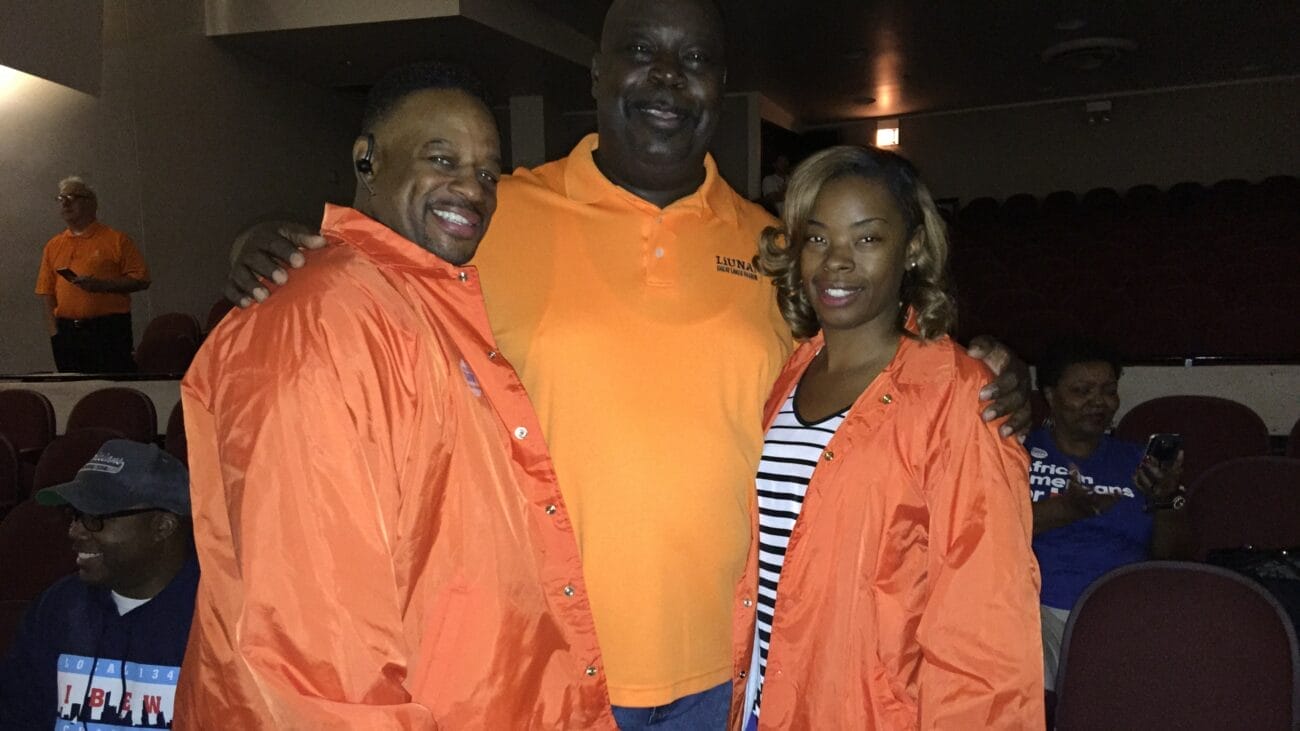FORMER LABORER LOCAL One Business Agent Bobby Peak (far left) is pictured at a LIUNA event with James “Smoke” Ellis, former business manager for Streets and Sanitation Workers, Local 1001, and Teresa Smith.
One text message contained a photo of a skin-clad Black woman offering sex. Another text shows a Black man captured on surveillance camera after he robbed a bank. There were also Black figurines of a Black pimp with exaggerated features and Black minstrel musicians. Then there’s the text message showing a television weatherman rubbing a large cartoon image of a penis while giving the forecast.
At Laborers Local 1 Chicago union, Bobby Peak II, was made to be a waterboy who fetched water for staff meetings. On top of a barrage of text messages, he was sent to work in white neighborhoods where one resident called the police on him.
When Peak complained about these incidents and text messages, he was told to “suck it up” before he was fired from his job on January 17, 2018. He had been an employee at Local 1 as a Business Agent/Auditor for two years. Prior to being appointed, he worked as a laborer/union steward under the guise of Superintendent John Valasco of FCL Builders. Peak worked as a construction laborer for over 20 years with Laborers’ International Union of North America (LIUNA) on various building projects.
Those are allegations in an explosive federal lawsuit that Peak filed against Local 1, a union for construction workers located at 8618 West Catalpa Avenue, Suite 1101, on Chicago’s northwest side. With a mountain of evidence against them, Local 1 tried to dismiss the complaint in federal court.
The Illinois Human Rights Commission found the evidence so outrageous; it slammed Local 1 and concluded that Peak was a victim who was unlawfully terminated, and discriminated against after he endured a hostile work environment fueled by racist behavior that, despite complaints, continued on a weekly basis as it went unchecked.
The lawsuit contains copies of racially explicit text messages and photos that Peak says he received from his supervisor and other employees he worked with during his shifts as the union’s first Black Business Agent. The lawsuit also includes photos and allegations of Peak being given Black figurines with exaggerated features along with crude messages peppered with racial stereotypes of Blacks.
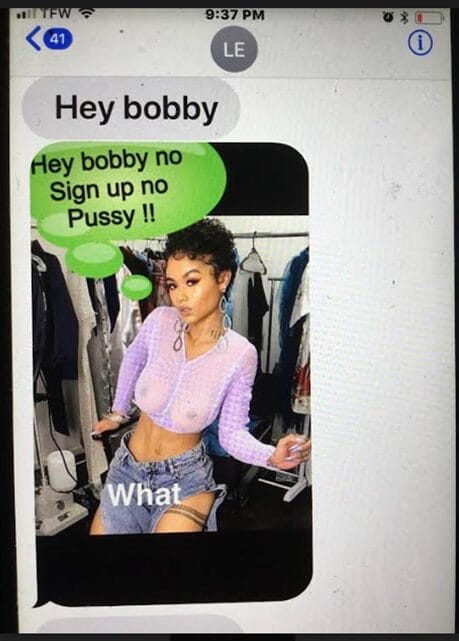
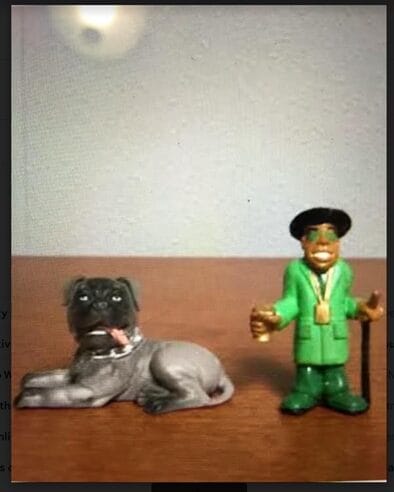
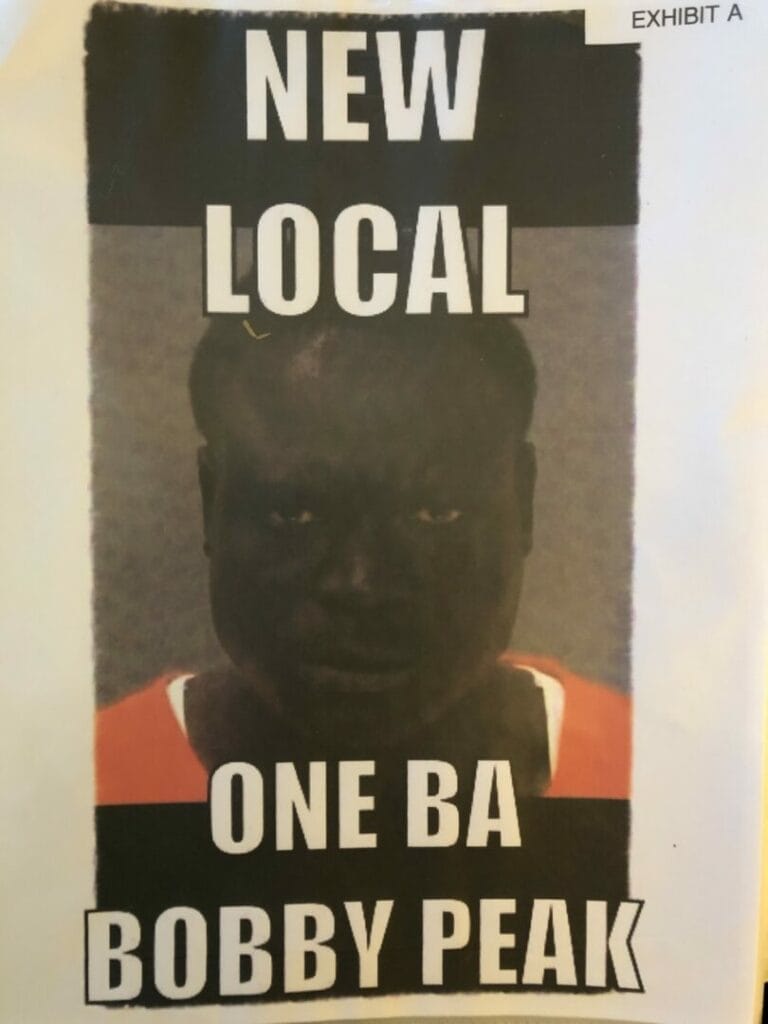
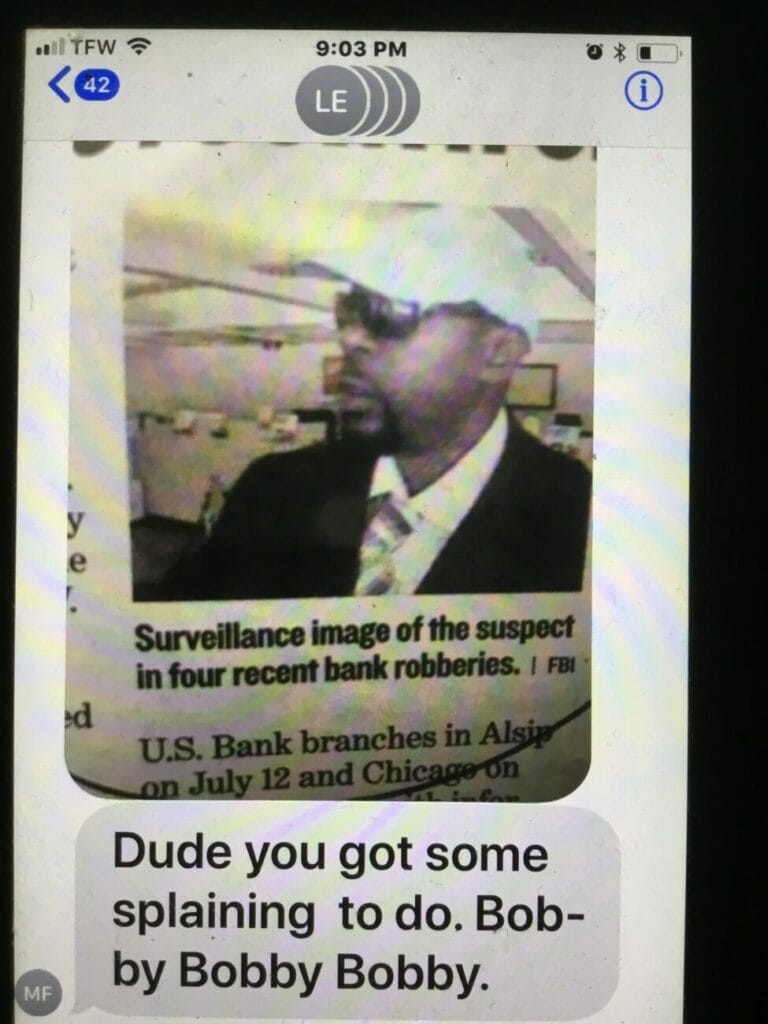
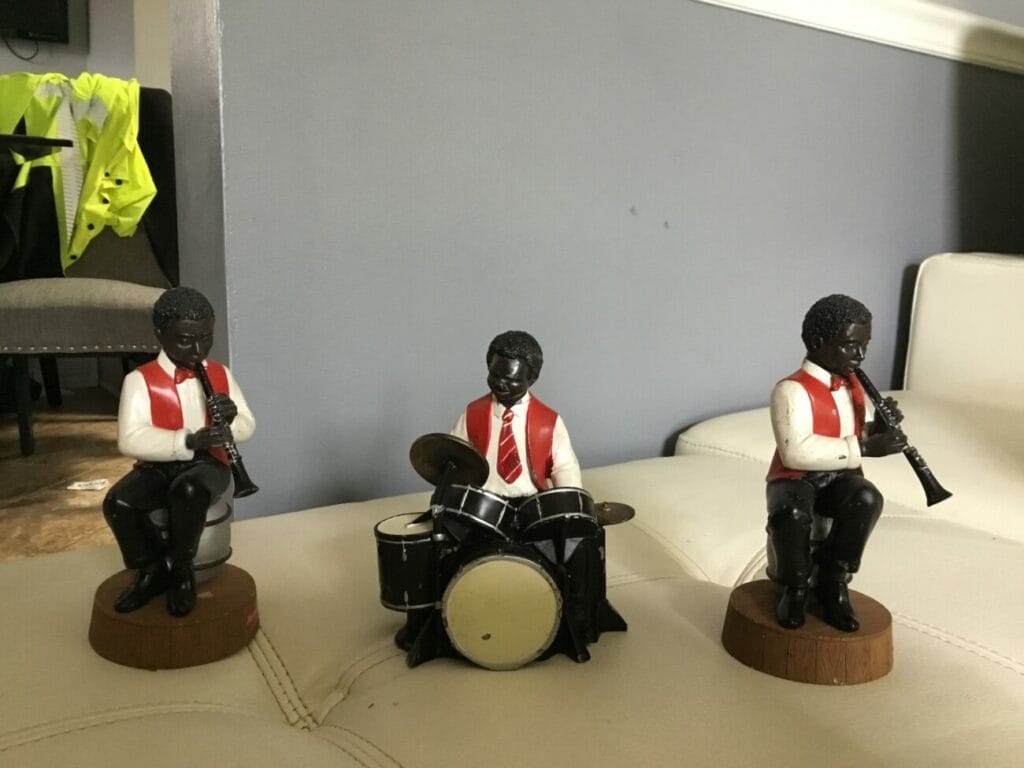

Peak’s lawyer, Chiquita Hall-Jackson, says the evidence is proof that her client was a victim of harassment, intimidation, humiliation, and a racially hostile work environment that left Peak with emotional and mental scars.
At the heart of the lawsuit is Peak’s supervisor, Leo Esparza, Local 1’s top-ranking business manager who Peak and his lawyer alleged promoted the racist behavior by not only engaging in it himself but allowed other key employees to do the same.
On top of the alleged harassment, Peak’s lawsuit paints Labor 1 as a place where he was micromanaged and forced to serve as the union’s “waterboy” during meetings where he was required to go out and purchase water for his colleagues. And at the same job, the lawsuit alleges, Peak was given another role outside his responsibilities: working in white neighborhoods, where one resident allegedly called the police on him, and called Peak a “Black MF.”
In 2016, Local 1 hired Peak as one of the union’s business agents. Peak said his role was to visit and monitor construction sites and make sure workers’ certifications are current.
It was a job Peak said made him that local union’s first Black business agent. But Peak said things quickly turned sour for him on the first day when Esparza allegedly showed up at Peak’s house announced to give him a drive to work. According to the lawsuit, Esparza “invited” himself into Peak’s home and “took inventory of Peak’s possessions. That was followed by insults that he was getting paid too much based on his possessions.”
“He wanted to come in and see how this Black man was living,” Peak told the Crusader. “He said, ‘Where’s the wife and kids?’ I said, ‘They’re all grown.’
“Then he said, you have big flat screen TVs in every room. I said, ‘Yeah I have relatives who come over and spend the night.’
From that point, Peak said things went downhill between him and Esparza and three additional Local 1 employees, Vice President Marty Flanagan, President Frank Damato (now deceased) and Peter Fosco, the union’s secretary-treasurer. For the remainder of Peak’s employment at Local 1, he alleged that Esparza, Flanagan, and Fosco would contribute to the racially hostile work environment filled with unwelcomed and inappropriate text messages, crude comments and incidents aimed at humiliating him.
In one alleged incident, Peak said Esparza gave him three small Black figurines of musicians that resemble those who played in racist minstrel vaudeville shows during the Jim Crow era. In the lawsuit, Peak said Esparza gave him the objects at Esparza’s house, weeks before Peak was terminated. The lawsuit says Peak was also given a Black figurine of pimp wearing a green suit and Black-faced pit bull were placed on his desk during the Christmas season in 2017.
“No one took the position to stop this. Instead, they replied and joked about the mistreatment,” Peak alleges in his complaint.
In the lawsuit, Esparza said he “gifted” Peak the figurines because Peak expressed an interest in them. But Jackson, Peak’s lawyer, argued there are no text messages or evidence that indicated Peak’s interest in the objects. Jackson also argued Esparza did not gift the white employees with similar items.
Perhaps the most damning part of Peak’s lawsuit are numerous explicit text messages and photos, some of which are too graphic to print for this story. One photo that Peak said was sent to him was a mugshot of a very dark-skinned Black man in an orange prison suit. The man is not Peak but the message reads, “NEW LOCAL, ONE BA, BOBBY PEAK.”
Speaking on behalf of her client, Jackson, said in the lawsuit, “Esparza tried to cover up his bias and humiliating behavior with the idea that he was calling Peak a ‘bad ass.’ This is clearly untrue.’ He was calling Peak a Black convicted male because he was aware of his background and his race.”
Another photo is of a Black woman whose breasts can be seen through a light transparent blouse. Sent by Esparza, it reads: “Hey Bobby no Sign up no Pu—y,”
In another text sent by Esparza, there’s a photo of a Black man that accompanies a story about a bank robber captured on surveillance camera. The text includes a message from Esparza: “Dude, you got some explaining to do. Bobby, Bobby, Bobby.”
Another text message is a video that shows a cartoon image of a giant red penis covering the map of the United States while the weatherman is giving the forecast. When one presses the play button, the weatherman appears to be rubbing the penis up and down.
Peak also received a graphic text message of a photo of testicles allegedly sent by Fosco. Esparza in the group text asks, “Is that the 2017 eclipse???”
“Tea Bags,” someone responds.
Another group text message is of a goat strapped with two rifles on each side of its body. The message says, “I’LL BE DAMNED IF I GET RAPED BY A MUSLIM TODAY.”
According to the lawsuit, during staff meetings, Peak was required to go out and purchase water for colleagues during staff meetings. He would be referred to as Bobby Boucher-the Waterboy.”
According to the lawsuit, “Peak found the idea of him being required to go out and purchase water for all meetings and set up all meetings, as the only Black employee to be degrading.”
Peak’s lawyer said her client was never called the n-word in the office. But Esparza in the fall of 2017 allegedly reassigned Peak to cover construction sites by himself in predominately white suburbs in the northern and northwestern suburbs outside Chicago. In Villa Park, a predominately white suburb located 20 miles west of Chicago, a white resident called the police on Peak, believing he was up to no good.
According to the lawsuit, Peak was called a “Black MF”) and subjected to phrases like, “I did not know Local 1 had a Black business agent.”
Another allegation in the lawsuit says Peak was restricted from going to the bank to make deposits, as his job requires.
According to the lawsuit, Peak’s employer said Peak welcomed the behavior because he never reported it. But Jackson, Peak’s lawyer said this is untrue. Jackson said her client repeatedly said he was “offended and felt degraded” while employed at Local 1.
“He did complain to Esparza but was told to ‘suck it up.’
“Despite his multiple complaints, did not agree with the harassment and was silenced to protect his job. A job that he relied on to maintain a roof over his head and food on the table.”
Peak and his attorney place most of the blame on Esparza. According to the lawsuit, “Esparza was the main harasser to Peak out of all the employees. Esparza was the business manager for local and held the highest position in the organization…There was no one to report his behavior to that could have been any help to Peak during his time at Local 1.
“It is indisputable here that Esparza had the ability to hire, fire, demote and transfer Peak’s employment.”
On January 17, 2018, Peak was notified of his termination by Attorney Robert Bloch, whose law firm, Dowd, Bloch, Bennett, Cervone, Auerbach & Yokich LLP, represents Local One. In the termination letter, which the Crusader obtained, Bloch said Local One conducted a criminal background check and discovered a 2009 cocaine possession on Peak’s record. Citing a labor law, Bloch in the letter said the conviction bars Peak from working at any labor organization for 13 years.
The Crusader left several messages with Bloch and Local One but has not heard back.
Peak filed a lawsuit on March 24, 2020, in the U.S. District Court of Northern District Illinois in The Loop. Lawyers for Local 1 tried to have Peak’s lawsuit dismissed, but the judge denied the union’s request. However, Peak’s claim of being terminated based on racial discrimination and retaliation was dismissed. But his claims of working in a hostile work environment based on his race remain intact.
Nearly two months after Peak was terminated, he filed a complaint with the Illinois Human Rights Commission on March 13, 2018. The commission in December 2019, concluded that Local One violated Peak’s civil rights violations and that he had been unlawfully terminated.
In a six-page ruling, the commission concluded that the Local One’s reason for firing Peak was “a pretext for unlawful discrimination.”
The commission also said Local One’s workplace was “rife with discriminatory animus” and that “the employees’ text messages show direct evidence of discrimination.”
In investigating Peak’s claims, the commission concluded that Local One failed to do a criminal background check on him and that Peak disclosed his criminal record before he was hired.
Peak, the commission, said, “suffered embarrassment, insult and emotional injury, loss of employment wages, benefits and seniority, damage to his personal and professional reputation, attorney’s fees and costs.”
While the lawsuit remains in federal court Jackson, Peak’s attorney has reached out to Local 1’s attorney to discuss a possible out-of-court settlement rather than allow the case to drag on for years in court.
“We definitely hope we can resolve this on Tuesday, if not we’ll go to a jury trial,” Jackson told the Crusader.
Meanwhile, Peak struggles to heal from his experience at Local One.
“Why did they treat me like this?” Peak said. “I was trying to show them that I was a hard worker who did what was right. I don’t understand.”
Updated April 28, 2024 to reflect correct years of employment and job title.

